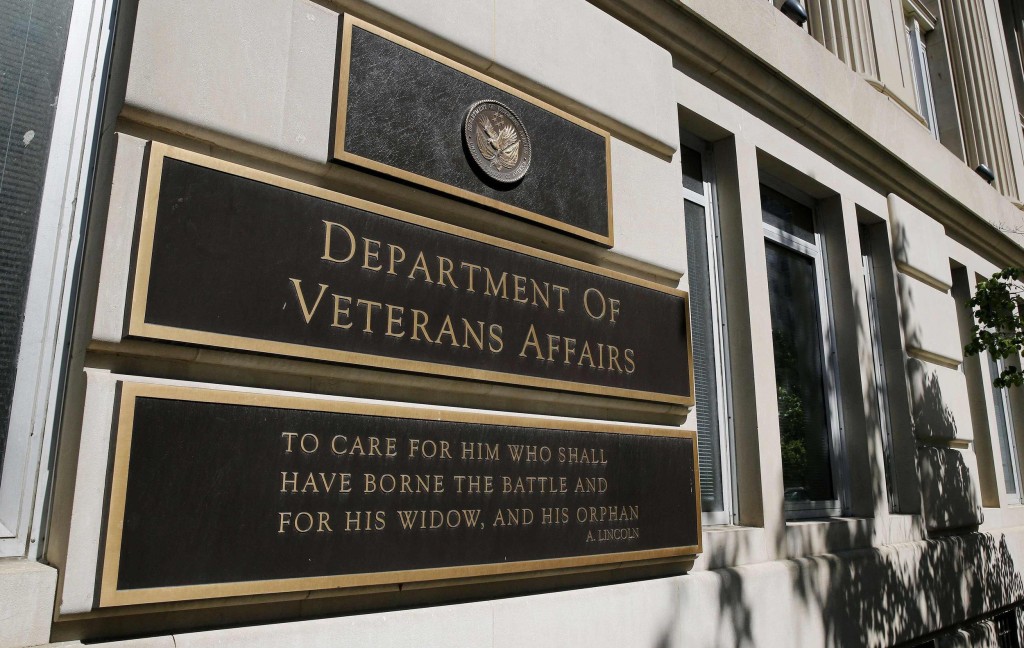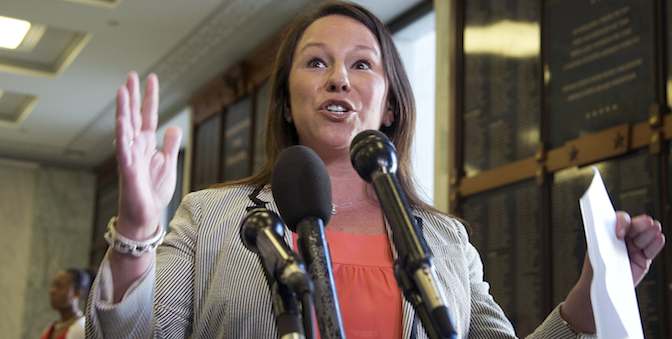Drugs vanish at some VA hospitals

Federal authorities are stepping up investigations at Department of Veterans Affairs medical centers due to a sharp increase in opioid theft, missing prescriptions or unauthorized drug use by VA employees since 2009, according to government data obtained by The Associated Press. Doctors, nurses or pharmacy staff at federal hospitals — the vast majority within the VA system — siphoned away controlled substances for their own use or street sales, or drugs intended for patients simply disappeared. Aggravating the problem is that some VA hospitals have been lax in tracking drug supplies. Congressional auditors said spot checks found four VA hospitals skipped monthly inspections of drug stocks or missed other requirements. Investigators said that signals problems for VA’s entire network of more than 160 medical centers and 1,000 clinics, coming after auditor warnings about lax oversight dating back to at least 2009. “Drug theft is an area of concern,” Jeffrey Hughes, the VA’s acting assistant inspector general for investigations, told AP. He said the monthly inspections could help the VA uncover potential discrepancies and root out crime. Both the inspector general’s office and the Drug Enforcement Administration said they have increased scrutiny of drug thefts from the VA, with the DEA reporting more criminal investigations. It’s not clear if the problem is worse at the VA than at private facilities, where medical experts and law enforcement officials say drug theft is also increasingly common in a time of widespread opioid abuse in the U.S. But the VA gets special scrutiny from lawmakers and the public, given Americans’ esteem for ex-servicemembers served by the agency and because of past problems at the VA, especially a 2014 wait-time scandal in which some patients died. “Those VA employees who are entrusted with serving our nation’s wounded, ill and injured veterans must be held to a higher standard,” said Joe Davis, spokesman for Veterans of Foreign Wars. The drug thefts will be among the challenges facing newly confirmed VA Secretary David Shulkin, who served as the department’s undersecretary of health while the drug problem was growing. At his confirmation hearing this month, Shulkin said he was proud that the VA identified the opioid addiction problem before others did and “recognized it as a crisis and began to take action.” Still, the VA acknowledges it has had problems keeping up with monthly inspections and said it was taking steps to improve training. It also said it was requiring hospitals to comply with inspection procedures and develop plans for improvement. It did not respond to AP requests made three weeks ago to provide a list of VA facilities where drugs had been reported missing or disciplinary action was taken, saying it was still compiling the information. Reported incidents of drug losses or theft at federal hospitals jumped from 272 in 2009 to 2,926 in 2015, before dipping to 2,457 last year, according to DEA data obtained by AP. “Federal hospitals” include the VA’s more than 1,100 facilities as well as seven correctional hospitals and roughly 20 hospitals serving Indian tribes. The inspector general’s office estimates there are nearly 100 open criminal probes involving theft or loss of VA controlled substances. Three VA employees were charged this month with conspiring to steal prescription medications including opioids at the Little Rock, Arkansas, VA hospital. The inspector general’s office says a pharmacy technician used his VA access to a medical supplier’s web portal to order and divert 4,000 oxycodone pills, 3,300 hydrocodone pills and other drugs at a cost to the VA of $77,700 and a street value of $160,000. Christopher Thyer, the U.S. attorney overseeing the case, said the employees were abusing their position to steal from taxpayers and “poison the communities we live in with dangerous drugs.” The drug thefts from VA also raise the possibility that patients will be denied medication they need or that they will be treated by drug-impaired staff. In one case, a former VA employee in Baltimore pleaded guilty on charges that he injected himself with fentanyl intended for patients heading into surgery, then refilled the syringes with saline solution. Patients received solution tainted with the Hepatitis C virus carried by the employee. Dr. Dale Klein, a VA pain management specialist, said some of his patients suspected they weren’t getting the drugs they needed, including one patient with an amputated leg who had to do without morphine because a VA pharmacy said it did not have enough in supply. Klein, who is part of a whistleblowers network called VA Truth Tellers, ran a VA pain clinic from 2015 to 2016 and has filed a retaliation claim against VA, saying the VA restricted his work after he voiced complaints. The VA has said it was looking into the claims. Klein described several of VA’s inventory lists as inconsistent or a “slapdash rush job.” That concern was underscored by the findings from the Government Accountability Office, released last week, that drug stockpiles were not always being regularly inspected. Klein’s attorney, Natalie Khawam, says she’s heard similar complaints from other clients at their VA hospitals. The GAO review, covering January 2015 to February 2016, found the most missed inspections at VA’s hospital in Washington, D.C., according to a government official familiar with confidential parts of the audit. Monthly checks were missed there more than 40 percent of the time, mostly in critical patient care areas, such as the operating room and intensive care units. That adds to the risk of veterans not receiving their full medications. The Washington hospital also missed inspections of the facility’s pharmacy for three straight months, violating VA policy, according to the official, who insisted on anonymity to reveal findings that weren’t public. In the last year, the hospital had at least five incidents of controlled substances that were “lost” or otherwise unaccounted for, according to the DEA. Other problems were found in VA hospitals in Seattle, Milwaukee and Memphis, Tennessee. Milwaukee had the fewest, which the GAO attributed to a special coordinator put in place to ensure inspection compliance. Responding
Donald Trump hosts candidates for key Veterans Affairs post

President-elect Donald Trump met Tuesday met with candidates for his unfilled Cabinet positions, including prospective hires to run the Department of Veterans Affairs, a beleaguered agency that the Republican businessman has vowed to overhaul. Vice President-elect Mike Pence met with members of his incoming national security team a day after acts of violence rocked the world. At Mar-a-Lago, Trump’s palatial Florida estate, was slated to meet with Luis Quinonez, who runs a company with military and health care ties and is said to be under consideration for VA secretary. He also is set to meet with Toby Cosgrove, the CEO of the Cleveland Clinic, who was a top contender to replace Eric Shinseki when he resigned at the VA in 2014. Cosgrove later withdrew from consideration. Trump repeatedly pledged during the campaign to fix the woes at the department and said he would “take care of great veterans.” But he also came under scrutiny for being slow in paying out money raised for veterans groups and for suggesting that “strong” veterans don’t need treatment for mental health problems. Others said to be considered for the post include former Massachusetts Sen. Scott Brown, Florida Rep. Jeff Miller and Pete Hegseth, an Army veteran and former CEO of Concerned Veterans for America. Trump is also considering Jovita Carranza, who worked in President George W. Bush‘s administration, as his choice for U.S. trade representative. She served as deputy administrator of the Small Business Administration under Bush. With just a handful of Cabinet posts to fill, Trump is facing some criticism for a lack of diversity in his senior team, which currently includes no Hispanics. The National Association of Latino Elected and Appointed Officials said Tuesday that it was “deeply concerned” at the lack of Hispanics considered for top jobs. Carranza was a member of Trump’s Hispanic advisory council during the campaign. Pence, meanwhile, met in Washington with former Texas state official Susan Combs, who served both as state agriculture commissioner and comptroller. Trump also needs to fill the Agriculture Cabinet slot. Transition officials did not immediately confirm if Combs is up for that post. Earlier Tuesday, Trump was back on Twitter striking out after Bill Clinton told a suburban New York City newspaper this month that Trump “doesn’t know much. One thing he does know is how to get angry, white men to vote for him.” The Bedford-Pound Ridge Record Review also reported that Clinton claimed that Trump called him after his election victory over Hillary Clinton. “Wrong, he called me (with a very nice congratulations),” Trump tweeted. The president-elect added that Clinton is the one who “‘doesn’t know much’… especially how to get people, even with an unlimited budget, out to vote in the vital swing states (and more).” The Clinton campaign, he said, “focused on the wrong states.” Clinton later responded on Twitter, writing, “Here’s one thing @realDonaldTrump and I can agree on – I called him after the election.” The tweets come after a rattling day of violence around the world – with Trump appearing to jump ahead of investigators to blame Islamic terrorists for deadly incidents in Turkey and Germany and vowing anew to eradicate their regional and global networks. Pence met with retired Lt. Gen. Mike Flynn, the incoming National Security Adviser; retired Gen. John Kelly, Trump’s nominee for head of Homeland Security; retired Gen. James Mattis, the pick for Defense Secretary; and Rex Tillerson, the head of Exxon Mobil and the intended nominee for Secretary of State. Aides said the meeting was planned before the acts of violence, though they would be discussed. Republished with permission of The Associated Press.
Donald Trump auditions Cabinet prospects high above Manhattan

Donald Trump held court from his perch high above Manhattan on Monday, receiving a line of former rivals, longtime allies and TV executives while overseeing a presidential transition that at times resembles a reality show like the one he once hosted. Trump met with nearly a dozen prospective hires, all of whom were paraded in front of the cameras set up in the Trump Tower lobby as they entered an elevator to see the president-elect. Out of public view himself, he fell back on his TV star roots by filming a video that touted his legislative goals once he takes office. Trump; did not immediately announce any appointments after the meetings, which came on the heels of a two-day whirlwind of interviews at his golf course in Bedminster, New Jersey. Unlike his predecessors, who often spoke with Cabinet candidates under a cloud of secrecy, Trump has turned the search into a very public audition process. The extraordinary exercise took on a routine feel on Monday: First, former Massachusetts Senator Scott Brown stepped off the gold-plated elevator into the marble-coated lobby after his meeting to declare to waiting reporters that he was “the best person” to become Veterans Affairs secretary. Next, Oklahoma Gov. Mary Fallin, a candidate for interior secretary, did much the same, striding off the lift to say she had “a wonderful discussion” with Trump. Former Texas Governor Rick Perry declined to speak to reporters, but he did take time for a photo with the Naked Cowboy, the underwear-sporting, guitar-strumming New York institution who is normally a fixture at Times Square but has spent recent days camped out at Trump Tower singing about the president-elect. Democratic Hawaii Rep. Tulsi Gabbard, who resigned her post on the Democratic National Committee after endorsing Bernie Sanders over Hillary Clinton, also met with Trump but entered and exited out of sight. She later defended crossing party lines to meet with Trump about U.S. involvement in Syria, saying in a statement she would never “play politics with American and Syrian lives.” Former House Speaker Newt Gingrich, a longtime Trump ally, also arrived with his wife, Callista, and told reporters that he indicated to Trump that he was interested in being a “senior planner” to coordinate long-term political efforts among the Republicans in control of all three branches of government. Senior adviser Kellyanne Conway said of the visitors, “Not all of them will be in his Cabinet and his federal government, but they are all incredibly important in offering their points of views, their experience and certainly their vision of the country.” No one was saying whether Trump would announce more appointments before heading to Florida for Thanksgiving. He was planning to leave Tuesday or Wednesday to spend the holiday at his Mar-a-Lago estate, while Vice President-elect Mike Pence will spend Thanksgiving in Mississippi, where his Marine son is stationed. Trump has largely remained out of sight since winning the election, save for a flurry of brief public appearances over the weekend, often with Pence at his side, to flash thumbs-ups and provide quick updates on his progress in building a government. He remained in the upper floors of his skyscraper Monday, seeking counsel on the phone and interviewing candidates all while keeping an eye on the cable news coverage of the day’s events. He appeared in a two-and-a-half minute video released late Monday in which he pledged to the American people that he was appointing “patriots” to his administration and reiterated a number of his campaign promises, including plans to renegotiate trade deals, scrap excessive regulations and institute a five-year ban on executive officials becoming lobbyists. The video — which made no mention of key pledges to build a border wall with Mexico or repeal the Affordable Care Act — continues the president-elect’s practice of trying to go over the heads of the media and take his case directly to the American public. Since Election Day, he has twice ditched the group of reporters designated to follow his movements and has so far eschewed the traditional news conference held by the president-elect in the days after winning. Trump has not held a full-fledged news conference since July. But the media were clearly on his mind as he met with executives and on-air personalities from TV networks. He frequently singled out the media — declaring them “so dishonest” — for criticism during the campaign, but it’s not unusual for presidents to hold off-the-record meetings with journalists when trying to promote policies or programs. Among the attendees were NBC anchor Lester Holt and “Meet the Press” host Chuck Todd, ABC’s “Good Morning America” host George Stephanopoulos and anchor David Muir, CBS’ “Face the Nation” host John Dickerson, CNN’s Wolf Blitzer and several executives at the networks. None of the attendees would discuss the meeting with reporters in the lobby, though Conway said it was “very cordial, very productive, very congenial.” Those Trump met with over the weekend included former Massachusetts Gov. Mitt Romney, a former critic now being considered for secretary of state; retired Marine Corps Gen. James Mattis, who Trump dubbed an “impressive” prospect for defense secretary, and billionaire investor Wilbur Ross, who is under consideration for Commerce secretary. “We’ve made a couple of deals,” Trump said Sunday. He gave assurances that “incredible meetings” would be bringing “incredible people” into the government. Republished with permission of the Associated Press.
Martha Roby applauds U.S. House passage of VA reform legislation

A bill that would create greater accountability measures on Department of Veterans Affairs workers and enhance protection for whistleblowers who expose wrongdoing passed the U.S. House of Representatives on Wednesday. The H.R. 5620: VA Accountability First and Appeals Modernization Act, would allow the VA secretary more flexibility to fire, demote or otherwise punish mid-to-lower level employees for misconduct or poor performance, according to a release sent out by the bill’s co-sponsor Alabama 2nd District U.S. Rep. Martha Roby. According to Roby, the current accountability measures only apply to senior managers and not rank-and-file employees. Roby said the legislation will make a difference in improving care for veterans. “The Central Alabama VA was home to some of the worst abuses nationwide,” explained Roby in a release. “Because of the corruption and misconduct we exposed, the director became the first senior manager fired for cause under the new VA accountability law. That was certainly needed, but it didn’t go far enough.” “I’ve said all along that the blame for what happened does not rest with one person alone. There has been a culture of complacency at the VA throughout the ranks because mid-to-lower level employees know they can almost never be fired. This reform bill changes that by finally giving the VA Secretary the authority to swiftly fire, demote or otherwise punish employees for poor performance or misconduct.” Working with whistleblowers and the press, Roby helped expose major instances of malfeasance and mismanagement that resulted in the Central Alabama VA director being the first senior manager in the country fired under the reform law enacted in 2014. However, that law only allowed the Secretary to deal with senior leaders, not mid-to-lower level employees. Wednesday’s bill would expand those measures down the ranks to ensure all employees can be held accountable for misconduct or poor performance in the treatment of veterans. Roby also lauded the whistleblower protections contained in the bill, calling the treatment of her sources “a disgrace.” “The bill also enhances protections for whistleblowers, and I cannot emphasize enough how important that is. If it weren’t for the brave whistleblowers who told me the truth, who knows if we’d have ever gotten to the bottom of the problems in Central Alabama,” said Roby. “And, the way they were treated was a disgrace. There need to be real consequences for intimidating or retaliating against whistleblowers, and this bill delivers just that.” In summary, H.R. 5620 does the following: Authorizes the Secretary of Veterans Affairs to fire, or demote any VA employee for performance or misconduct. Employees would be afforded due process, including an expedited appeal to the Merit Systems Protections Board; Authorizes the Secretary to reduce a senior manager’s pension if they are convicted of a felony related to their job. Enhances protections for whistleblowers by providing additional reporting mechanisms and mandating that any supervisor found to have retaliated against a whistleblower be suspended or terminated, with the possibility of bonus recoupment. Improves the VA’s appeals process by giving veterans more options and better clarity for pursuing an appeal.
New Mobile, Ala. Veterans Affairs clinic finally on way

Soon veterans living in Mobile won’t have to travel far to receive care. A new clinic has been approved by the U.S. Department of Veterans Affairs to replace the current, outdated clinic on Springhill Avenue. Thanks in part go to Alabama 1st District U.S. Rep. Bradley Byrne, who’s made getting a new VA clinic one of his top priorities in Congress. Byrne made the announcement of the new clinic in a press release Thursday afternoon. “This announcement is music to the ears of the over 50,000 veterans who live in Southwest Alabama,” said Byrne. “Since being elected to Congress, I have repeatedly called on the VA to move forward with this project. It is a shame the process took as long as it did, but the new facility will be able to better serve those who have given so much to our country.” Byrne continued, “The work is not done. I will continue to provide diligent oversight throughout the construction process to ensure the project remains on schedule. We must also continue pushing for reforms at the VA to ensure accountability and promote greater choices for our veterans.” Last April, Byrne sent a letter to Department of Veterans Affairs (VA) Secretary Robert McDonald, urging the VA to expedite construction of a new VA clinic in Mobile. More information on the new clinic is not yet available.
For veterans, Birmingham ranked one of America’s worst cities

Veterans Day is just around the corner, where America will stop and salute all of those who have served proudly — our veterans. But pride and gratitude don’t change the facts on this national holiday. There are 19.3 million veterans living in the United States and close to 422,000 of them are struggling to find work. In honor of those who fought bravely in the name of American freedom, personal finance website WalletHub conducted an in-depth analysis of 2015’s Best & Worst Cities for Veterans in order to help veterans find the most livable cities to call home. According to their study, one Alabama city ranked as one of the worst large cities in the country for veterans to live in. Birmingham ranked 85 overall, making it the 15th worst city for veterans. WalletHub analysts compared 100 of the most populated U.S. cities across 18 key metrics — including the veteran unemployment rate, housing affordability, number of homeless veterans, educational opportunities, number of veteran benefits,the availability of Veterans Affairs health facilities — to determine their rankings. Source: WalletHub As for how neighboring cities fared, Birmingham came up short — Nashville ranked 62nd, New Orleans ranked 66th and Atlanta ranked 69th. Only Memphis came up worse, ranking an abysmal 93rd.
Presidential Primary Brief: 372 days until Election Day

118 days until AL Presidential Primary 372 days until Election Day Convention Dates: Republican July 18-21 2016, Democratic July 25-28 2016 Weekly Headlines: Poll: Hillary Clinton Hits 50 Percent Support GOP mega-donor Paul Singer endorses Marco Rubio NY Times Calls on Chris Christie to Drop Out of Presidential Race Press Clips: Small-dollar donors and the 2016 presidential election (Center for Public Integrity 10/27/15) Center for Public Integrity senior reporter Dave Levinthal appeared on C-SPAN’s “Washington Journal” program on Oct. 24 to detail the influence and importance of small- dollar donors in the 2016 presidential election. He also spoke more generally about how much money campaigns, nonprofits and super PACs are raising and spending. Ryan rules out immigration reform before 2016 election (LA Times 11/1/15) House Speaker Paul Ryan said Sunday he will not consider or negotiate an immigration reform bill during President Obama’s tenure, ruling out calls to revive the issue in an effort to broaden GOP appeal to Latino voters before the 2016 election. Ryan, who was elected speaker last week, said he had promised the conservative House Freedom Caucus, which opposes easing immigration laws, that he would not move forward on the issue before a new president takes office. Ryan, who appeared on Hive major TV talk shows, blamed Obama, not the caucus, however. In Virginia, Donald Trump unveils Veterans Affairs plan (CBS News 10/31/15) Calling the Department of Veterans Affairs “a total disaster,” business mogul Donald Trump unveiled his plan to reform the beleaguered department in front of thousands at a Saturday rally in Norfolk, Virginia. With the USS Wisconsin, a retired World War II-era battleship, docked behind him and with a number of veterans flanking the podium, Trump called for all veterans eligible for health care at VA hospitals to be allowed the same care at any hospital that accepts Medicare. This, according to Trump, would increase competition and decrease wait times. Major Florida newspaper editorial board: Marco Rubio should resign (Politico 10/28/15) The editorial board of one of Florida’s most prominent newspapers has a recommendation for Sen. Marco Rubio: just resign already. The editorial in the Florida Sun-Sentinel follows an interview the senator did with The Washington Post where he said he was “frustrated” with his chamber. The story also quoted a “longtime friend from Florida” who said “he hates it.” Well, the Sun-Sentinel editorial board has had enough. The Wednesday editorial said that the 2016 presidential candidate “has missed more votes than any other senator this year. His seat is regularly empty for floor votes, committee meetings and intelligence briefings. He says he’s MIA from his J-O-B because he Hinds it frustrating and wants to be president, instead.” Bill De Blasio Endorses Hillary Clinton For 2016 Presidential Bid (HNGN 10/30/15) New York Mayor Bill de Blasio finally announced Friday that he is backing Democratic front-runner Hillary Clinton’s bid in the 2016 presidential election. De Blasio said that Clinton was the candidate that was best suited to go to Washington and follow through on enacting liberal policies to combat income inequality. “The candidate who I believe can fundamentally address income inequality effectively, the candidate who has the right vision and the right experience to get the job done is Hillary Clinton,” he said during an early morning appearance on MSNBC’s “Morning Joe.” Bush team bracing for cash crunch (Politico 10/30/15) Jeb Bush’s campaign, wounded after another mediocre debate performance, is bracing for the possibility that revenue dries up in the coming weeks ahead. It’s a striking turn for a campaign that had embarked on a “shock and awe” approach to fundraising and then delivered a record-breaking haul of $114 million of hard money and super PAC dollars during the Hirst half of the year. After Wednesday’s bruising in the third GOP debate, Bush spent much of the latter half of this week responding to media questions about whether his presidential bid is now “terminal” or “on life support.” The candidate didn’t do himself any favors with his seemingly pained delivery of “having lots of fun” when asked if he’s enjoying himself on the trail.
Martha Roby: Breaking the bureaucracy

This week the U.S. House passed H.R. 1994, the VA Accountability Act, to empower the Secretary of Veterans Affairs with the legal authority to swiftly remove problem employees at all levels. You may recall that Congress passed a bill last year similarly empowering the Secretary to remove bad actors, but that legislation only authorized him to fire senior officials. Under this law, the former Central Alabama Veterans Health Care System (CAVHCS) director became the first official terminated, but as I said at the time, blame for all of the misconduct and mismanagement did not rest with one person alone. This bill is important in solving some of the broader problems the VA has had with accountability nationwide. However, more acute problems still exist at particularly troubled VA facilities that I believe require more specific action. While the director in Central Alabama was rightly removed this past August, the system has continued to struggle. Recently, VA medical centers in Montgomery and Tuskegee were identified as worst and second worst, respectively, in the nation for delays in patient appointment completions. Communication and coordination between various levels of management are still badly out of sync at a time when we can least afford it. And, VA leadership continues to point to the various layers of bureaucracy for why problems persist. That’s why this week I introduced legislation that would break through the bureaucracy and require top VA leaders to come in and take over failing systems, like Central Alabama. My bill, H.R. 3234, the Failing VA Medical Center Recovery Act, compels top VA leadership to send a “rapid response team” to take over our worst facilities and turn them around. This is the anti-bureaucracy. This is the team no complacent VA employee wants to see coming because they know the status quo is about to get shaken up. Much like the threat of a “takeover” of a failing school by the state superintendent, this puts VA medical centers on notice that we will no longer tolerate their incompetence on behalf of our veterans. Under my bill, determination of a failing facility would be based strictly on data — not media coverage or the opinion of the Secretary. And, the takeover trigger would be automatic, not optional or based on the whims of Washington. The House was right to empower the VA Secretary with the authority to enforce greater accountability. Now, we need to require him to use it to intervene at our worst performing facilities. That’s what the Failing VA Medical Center Recovery Act does, and I look forward to working with my colleagues on both sides of the aisle to advance this legislation in the coming weeks and months. Martha Roby represents Alabama’s 2nd Congressional District. She is in her third term.
Martha Roby, “tired of asking” for veteran care reform, calls for VA “takeover” of failing medical centers

On Tuesday, U.S. Rep. Martha Roby introduced a bill that would force the federal Veterans’ Administration to do something she has asked them to do for a long time: intervene when regional medical centers show they are unable to adequately care for American military veterans. Roby’s new proposal — H.R. 3234, dubbed the “Failing VA Medical Center Recovery Act” — calls for a “rapid response team of managers and medical professionals” to deploy to failing centers directly. “I believe the problem is we have been depending on a broken bureaucracy to fix itself,” said Roby in a prepared statement Monday. “I believe it’s time to change that by breaking through the bureaucracy to get results on behalf of our veterans.” “This is the ‘anti-bureaucracy.’ This is the team no complacent VA employee wants to see coming because they know that the status quo is about to get shaken up.” Roby represents Alabama’s 2nd Congressional District, where the state’s VA medical centers in Montgomery and Tuskegee have been identified as the nation’s worst and second worst, respectively. The third-term Republican said she will not allow inefficiencies in the “sprawling VA bureaucracy” that provides poor service to veterans stand any longer. “The determination of a failing medical center will be based on data, not the Secretary’s whim or what media attention it is garnering,” Roby said Monday. “My bill sets up an automatic trigger that compels the VA to act under the law. “I’m glad the [Veterans’ Affairs] Secretary [Robert McDonald] used his authority to take control of the situation in Phoenix. But, why not Montgomery? Why not Tuskegee? Why not come and take control of the worst and second worst situation in the country, especially after we have repeatedly asked and pleaded him to do so? “I’m tired of asking, and that’s why my bill requires the VA to step in and take charge.” See Roby’s House floor speech where she formally introduced the bill below.
U.S. House of Representatives: July 27-31

The U.S. House of Representatives came back in session Monday for its final week before a month-long August recess. On Monday, the House is in session and will consider a whopping 17 bills under suspension of the rules. Over half of these bills come from the Homeland Security Committee. A full list of bills can be found here. While not a part of the official House schedule this week, looming in the legislative shadows of Capitol Hill is the pending expiration of federal highway programs and funding. Two weeks ago, the House of Representatives passed an extension bill to provide highway funding through Dec. 18 in order to provide more time for the two chambers to come to an agreement on a full highway bill. However, last week and over the weekend, the Senate took under consideration a multiyear highway bill, putting the upper chamber at odds with the lower chamber as the debate over how to extend funding for the program, and for how long persists. The current authorization expires on Friday. Other legislation on the floor for a vote this week includes: H.R. 427: the Regulations from the Executive in Need of Scrutiny (REINS) Act. This bill aims to increase transparency in the federal regulatory process. The bill would modify the federal rule-making process by preventing “major rules” — those generally having an annual economic impact greater than $100 million — from being implemented unless Congress enacts legislation approving them. This legislation passed the House previously both in 2011 and 2013, but has no chance to pass the Senate and is strongly opposed by President Obama. Alabama co-sponsors: Rep. Bradley Byrne (AL-1), Rep. Martha Roby (AL-2), Rep. Mike Rogers (AL-03) Rep. Mo Brooks (AL-5) H.R. 1994: the VA Accountability Act. The bill expands the ability of the Veterans Affairs (VA) Department to fire or demote VA employees based on performance or misconduct. It also includes provisions to protect VA whistleblowers against retaliation by supervisors Alabama co-sponsors: Rep. Martha Roby (AL-02) H.R. __: VA Budget and Choice Improvement Act. This legislation has yet to be assigned a bill number, but is written to address a $2.5 billion gap in the VA budget. The shortfall is the result of higher-than-anticipated demand for veterans health services and a lack of flexibility to shift money within the overall VA budget, according to the VA. To cover the gap, the VA has asked Congress to allow the VA to divert $3 billion from the “Choice Program,” an emergency fund set up in the wake of last year’s wait-times scandal to subsidize non-VA care for veterans and help reduce the time it takes to get medical appointments. FY2016 National Defense Authorization Act (NDAA). While not officially on the schedule, there has been time set aside to consider a potential conference report that House and Senate conferees are currently working on as differences in the two chambers respective NDAAs remain unresolved.
Martha Roby: One year later, more improvement needed at VA

An important part of my job in Congress is making sure national Veterans Affairs leaders pay attention to Alabama and remain focused on improving the health care system our veterans depend on. That’s why this week I spoke from the House Floor to mark one year since former VA Secretary Eric Shinseki resigned amid scandal, and to draw attention to the many problems still persisting at the Central Alabama VA. Despite new legal tools and resources, we have not seen sufficient improvement in access to patient care. We haven’t seen it nationally, and we certainly haven’t seen it in Central Alabama. In fact, VA medical centers in Montgomery and Tuskegee were recently identified as worst and second worst in the nation for extended delays in patient appointment completions. A Central Alabama Veterans Health Care System workload report at the end of April showed that more than 6,500 consults over 90 days were still pending, including more than half awaiting approval for non-VA care services. I believe one reason for this lack of progress is that Washington has demonstrated a somewhat short attention span when it comes to fixing these problems. We got their attention last year. Working with whistleblowers and the press, we were able to expose major instances of misconduct, negligence and cover-up within the system. The wait-list manipulation scheme, the missing X-rays, the falsified patient records, the crack house incident – all these major exposures could not be ignored by top VA leaders in Washington. A lot of nice promises were made to improve Central Alabama, but since our problems left the front page, VA’s follow-up has been insufficient. Maybe that’s because we are depending on a broken bureaucracy to fix itself. Maybe it’s because we have been asking for VA leaders to intervene at this troubled system, rather than requiring them to. Maybe it’s time to change that, and I have an idea. When a public school continues to fail to meet basic standards, what happens? The state department of education steps in to takeover and takes charge of turning the place around. The process isn’t pleasant, but everyone from principals and teachers to students and parents understand the consequences of failure to improve. We need a similar mechanism at the VA when medical centers continually fail our veterans. That’s why I am preparing legislation that would compel national VA leaders to step in to take over perpetually failing systems and make the Secretary of Veterans Affairs squarely accountable for making sure troubled systems like Central Alabama get the attention they need. The bill is still in development, and I’ll update you on the latest as we proceed. One way or another, we are going to get their attention again. Martha Roby represents Alabama’s 2nd Congressional District. She is in her third term.
Martha Roby blasts Robert McDonald, President Obama over VA missteps
U.S. Rep. Martha Roby said Thursday that Veterans’ Affairs Secretary Robert McDonald and the Obama administration “need to spend less time on political posturing and more time correcting the ongoing mismanagement of VA health care systems.” Roby, a Republican who represents Alabama’s 2nd Congressional District, in a news release cited a recent memo Jan R. Frye reported in The Washington Post that portrayed an atmosphere of “lawlessness and chaos” surrounding the VA. Frye wrote in a memo addressed to McDonald that about $6 billion of taxpayer money was lost to what Roby called on Thursday “waste, fraud and abuse.” Roby also teed off on what her office called “independently refuted” accusations from President Barack Obama that recent problems with the Veterans’ Administration — a problem especially acute in parts of Roby’s district, which includes the Wiregrass region as well as parts of metropolitan Montgomery — stemmed from budget cuts pushed by the GOP-led House of Representatives in her statement, below: “While Secretary McDonald was falsely accusing House Republicans of cutting funding for VA healthcare, his department was responsible for billions in waste, fraud and abuse. “While President Obama was threatening to veto our appropriations bill over $1.4 billion in funding, the VA was blowing through four times that annually in misspent funds. “I have been told by senior VA officials in no uncertain terms that problems at systems like the Central Alabama Veterans Health Care System are ‘not about money.’ Today’s report further demonstrates that the rhetoric from the White House and Secretary McDonald was absurd, insulting and shameless. “They need to spend less time on political posturing and more time correcting the ongoing mismanagement of VA health care systems that is preventing our veterans from receiving timely, quality care.” Roby said in a news release she is preparing to advance legislation that would compel the VA Secretary to take over VA systems that perennially fail to meet certain standards.


